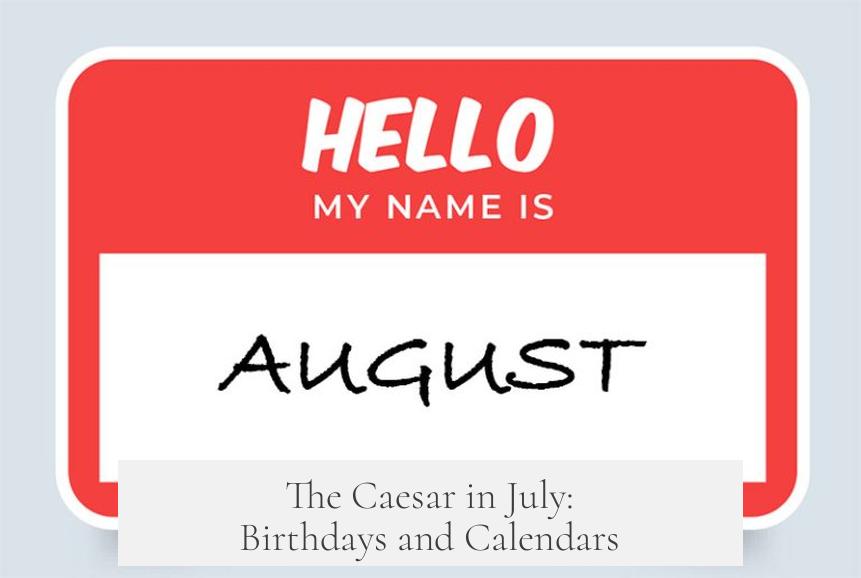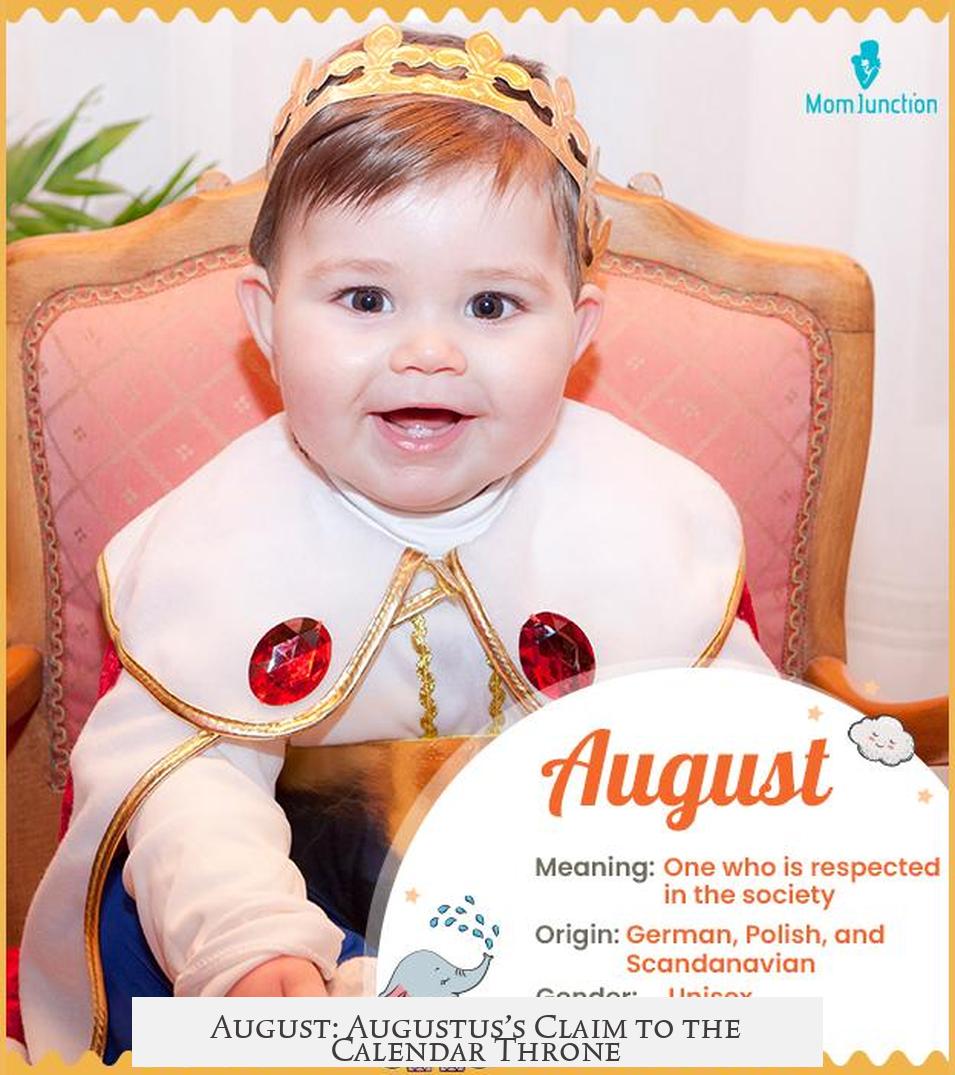We still call the months July and August because of historical decisions made during the Roman Empire, specifically linked to Julius Caesar and Augustus. Julius Caesar’s birth month, July, was renamed in his honor after his death. Augustus, the first Roman emperor, named August after himself. Unlike other emperors who attempted to rename months, these names stuck due to timing, lack of opposition, and political decisions by their successors.
July was originally called “Quintilis” in the Roman calendar, meaning the fifth month. Julius Caesar reformed the calendar, creating the Julian calendar, but the renaming of Quintilis to July happened posthumously to honor his birth month. This change was partly because Caesar’s birthday was in July, and it made sense to recognize his impact on the calendar system.
August was previously named “Sextilis,” meaning the sixth month. Augustus renamed it to stamp his legacy on the calendar. Unlike Julius Caesar, Augustus named the month himself during his lifetime. This act solidified his influence and ensured his name remained prominent. Historical records confirm Augustus was proactive about this renaming.
Other Roman emperors tried renaming different months after themselves or family members. For example, Nero renamed April, May, and June. Caligula renamed September to Germanicus, his father’s name. Commodus went further, renaming all twelve months based on his adopted titles. Despite these efforts, none of these changes lasted because of limited acceptance and political shifts after those rulers died.
Tiberius, Augustus’ successor, played a critical role in preserving the traditional month names. He refused honors that would rename months after him or his mother. His decision halted a potential wave of renaming, making later attempts by other emperors seem like upstarts and reducing their chance of lasting change.
The permanence of July and August’s names reflects a blend of respect for historical figures and political pragmatism. Since neither Julius Caesar nor Augustus faced strong opposition for their month-name honors and because Tiberius stopped the trend, these names survived and became standard.
- July renamed for Julius Caesar after his death, linked to his birthday.
- August named by Augustus himself during his lifetime.
- Tiberius refused similar renaming, preventing a domino effect.
- Other emperors’ renaming efforts failed due to lack of acceptance.
- These month names remain due to historical significance and political decisions.
Why Do We Still Call It July and August?

Ever wondered why the two dog days of summer still bear the names of Roman emperors and not some sizzle-themed terms like “Blister” or “Sweatember?” The simple answer is this: July is named after Julius Caesar and August after Augustus, and the names stuck because, well, nobody pushed back hard enough to change them.
Let’s unwrap this curious historical package, shall we?
The Caesar in July: Birthdays and Calendars

The month of July didn’t get its name because Julius Caesar was a sneaky self-promoter who slapped his own name on the calendar. No, it turns out it was renamed after his death. July marks his birthday, a convenient reason to honor the man who drastically reformed the Roman calendar—and yes, that reform actually happened under his watch.
Imagine his legacy as the ultimate birthday gift: a month forever etched with his name. That said, the fact he reshaped the calendar probably helped, even if it’s not explicitly recorded. He wasn’t just messing around with Julius salad recipes; this was a total calendar overhaul.
August: Augustus’s Claim to the Calendar Throne

Now, Augustus wasn’t shy about naming August after himself. Unlike Julius Caesar’s posthumous honor, Augustus got to enjoy the ego boost while still alive. It’s straightforward: Augustus liked having a month named after himself, and since he ruled after Julius, it made sense to have consecutive months named after two big Roman rulers.
Augustus *was* the first Roman Emperor, so the audacity seems fitting.
Why No One Else Stuck Their Name in the Calendar
Here’s where the story gets juicy. Other emperors tried to get their names in lights—or at least on calendar dates. Nero named April, May, and June after himself and family. Caligula renamed September — some say after his father Germanicus, but mostly to show off the name he wanted known. Domitian and Commodus took similar stabs, with Commodus even renaming all twelve months after himself. Imagine 12 months named Commodus. Shudder.
What stopped these month-renamings from sticking?
- No popular support: Early public enthusiasm mattered. July and August caught on because no one protested. Later renamings were politically unpopular and met with resistance.
- Tiberius’s example: Augustus’s successor Tiberius politely declined the honor of having months named after him or his mother. His decision broke a budding trend of empire-wide calendar ego boosts.
Tiberius basically said, “Thanks, but no thanks.” This refusal made it easier for later rulers to be seen as upstarts, not worthy enough for a calendar slot.
Calendar Chaos: Historical Epigraphy and Dating Nightmares
When emperors did rename months, it made dating things complicated. Historians and epigraphers face puzzles, especially with months called “Germanicus” — this could refer to reigns of Gaius (Caligula), Nero, or Domitian. So, historians often pick Domitian for clarity. But one can only imagine the confusion in the ancient world when somebody said, “See you in Germanicus,” and no one was sure which empire’s Germanicus they meant.
What If Tiberius Had Said Yes?
It’s tempting to imagine ancient Rome jampacked with months named after emperor after emperor. Thanks to Tiberius’s restraint, the calendar avoided becoming a political shouting match. Without him, people could have been flipping calendars trying to figure out if “Nero” was going to be followed by “Caligula” or “Commodus” month.
Tiberius’s refusal gave us a simple, consistent calendar for summer. Good for us, not so good for ego-driven emperors craving immortality via month-naming fame.
So Why Do We Still Call Them July and August?
Because:
- July was renamed after Julius Caesar, who reformed the calendar and whose birthday falls there.
- August was named by Augustus himself, during his reign.
- Subsequent emperors tried to rename months but failed due to lack of support and Tiberius’s break in the tradition.
- This break prevented chaos and political overreach in the calendar, making July and August’s names stand the test of time.
A Modern Reflection
Think about it. We live in a world where companies rename products and apps every two minutes. Yet, our calendar has kept these two names for over 2,000 years! It’s a silent testament to Roman history’s staying power—and maybe a little thanks to Tiberius’s humbling act.
Next time you complain about the heat in July or August, remember: those months are named for historical figures who left real marks (and arguably some ego bruises) on time itself. That’s quite the legacy.
What would you rename the hottest months of the year? Would you honor a ruler, a favorite fruit, or just call it “Freeze Now, Burn Later”? Feel free to share your thoughts below!
Why were July and August named after Julius Caesar and Augustus?
July was renamed after Julius Caesar because his birthday fell in that month. Augustus named August after himself during his reign. These changes linked the months to key Roman leaders.
Why did the names July and August stick when other month-renamings failed?
No one pushed to restore the old names for July and August. Later emperor-renamed months were unpopular, so their names were often reversed. Also, Tiberius stopped the trend by refusing to rename months himself.
What did Tiberius do that affected the naming of months?
Tiberius declined to rename September and October after himself and his mother. This refusal made it harder for later emperors to rename months permanently.
Did any other Roman emperors rename months after themselves?
Yes. Caligula, Nero, Domitian, and Commodus all renamed months after themselves or their family. However, these names didn’t last long and caused dating confusion.
How did the renaming of months affect Roman record-keeping?
Renamed months created challenges for dating inscriptions. For example, when the month was called Germanicus, it was unclear which emperor’s reign the document referred to, making historical dating tricky.




